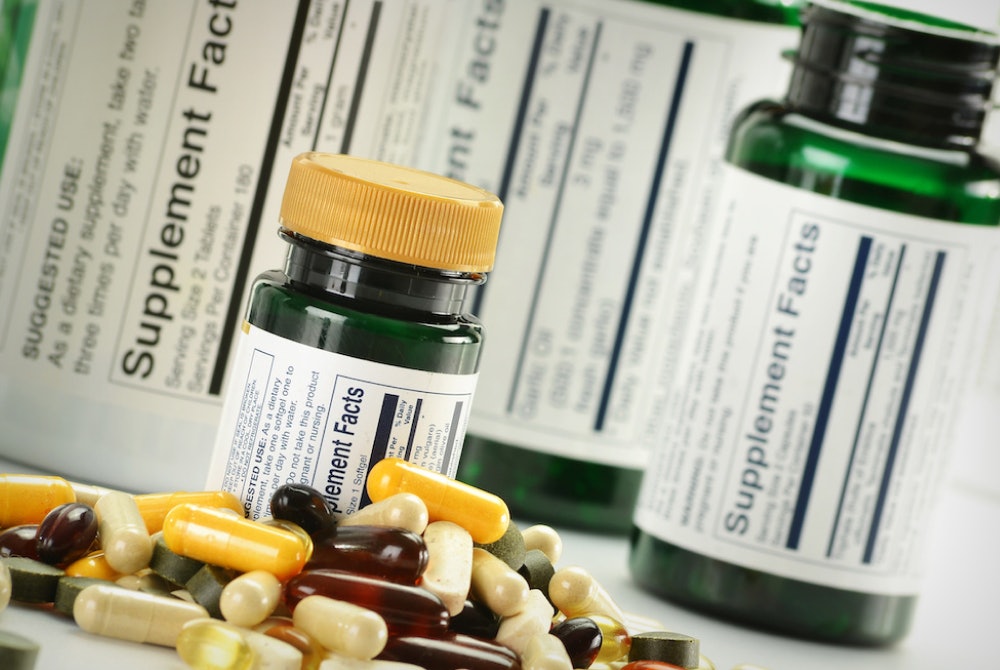- What are Dietary Supplements?
- Common Dietary Supplements
- Are Supplements Safe?
- How to Safely Buy Supplements
- How to Report Problems Caused by Supplements
- Frequently Asked Questions
Since the 1940s, Americans have been using dietary supplements as a way to help improve their overall health and well-being. Nowadays, millions of people have some form of supplement in their home—whether used as a way to lower their risk of certain diseases, lose weight, or to combat a vitamin deficiency. But are supplements safe?
Though some supplements can be beneficial for health reasons, they are not regulated by the U.S. Food & Drug Administration (FDA) and do not have to go through the same testing that drugs do.
What are Dietary Supplements?
Dietary supplements include a variety of products, from vitamins to minerals, enzymes, amino acids, and other herbal products. They can be found in the form of powders, gelcaps, softgels, tablets, drinks, and energy bars.
Though some supplements can be beneficial for health reasons, they are not regulated by the U.S. Food & Drug Administration (FDA) and do not have to go through the same testing that drugs do.
Common Dietary Supplements
Below are some of the most common dietary supplements on the market:
- Calcium
- Chondroitin Sulphate
- Echinacea
- Fish Oil
- Garlic
- Ginkgo
- Ginseng
- Glucosamine and/or
- Green Tea
- Saw Palmetto
- John’s Wort
- Vitamin D
Are Supplements Safe?
When used properly, most people can take dietary supplements safely, but they are not totally safe. Supplements can be risky for certain populations, especially when taking too much or combining them with certain medications.
Unlike drugs, they are not meant to treat, prevent, or cure any diseases. And consumers should be weary of any supplement making these claims.
The Benefits
Certain dietary supplements may reduce discomfort caused by certain conditions or prescription medicines and also may help reduce the risk of some diseases. They can also make you feel better if you’re not getting enough of the vital substances your body needs to function.
Common supplements that may benefit your health include:
| Supplement | Benefit |
| Vitamin A | Can help age-related macular degeneration by slowing down vision loss |
| Vitamin B12 | Can help make DNA, prevent anemia, keep nerve and blood cells healthy |
| Vitamins C and E | Prevent cell damage |
| Vitamin D | Helps strengthen bones |
| Calcium | Promotes bone health |
| Fish Oil | Supports heart health |
| Folic acid | When taken by pregnant women, reduces birth defects |
| Melatonin | Counteracts jet lag |
| Zinc | Slows down loss of vision from age-related macular degeneration and promotes skin health |
However, scientific evidence of their effectiveness isn’t completely clear. Though the National Institutes of Health has spent more than $2.4 billion studying supplements since 1999, they are still not fully understood.
The Risks & Side Effects
Unfortunately, there are also risks associated with taking supplements. Due to their active ingredients, many supplements can have strong biological effects in the body, making them unsafe for some.
In 2019, US poison control centers received nearly 70,000 calls due to dietary supplements, herbal preparations, and homeopathic treatments. These calls resulted in more than 7,000 people needing treatment at a healthcare facility while more than 800 led to moderate or severe outcomes.
However, since most individuals don’t call poison control following illnesses or side effects from drug interactions, those numbers may be much higher.
When Do Side Effects Occur?
Typically, side effects occur when people use supplements instead of medicine prescribed by their healthcare provider or when they take high doses.
Other ways in which supplements can have a negative or at times, life-threatening, effect include:
- Combining supplements
- Taking too much of certain supplements (e.g., vitamin A, vitamin D, or iron)
- Using supplements with medicines, both over-the-counter and prescription
- Taking them after surgery in some cases
As mentioned, some supplements can cause problems when taken along certain medications such as:
- Antioxidants: These may make some chemotherapy medicines less effective.
- Vitamin K: There is an increased risk of blood clotting when taking Vitamin K which can make the blood thinner.
- St. John’s wort: It has been shown to make some meds less effective such as medicines for depression, HIV, heart problems, and cancer.
It’s recommended that you speak with your healthcare provider prior to taking any supplements.
How to Safely Buy Supplements
Along with educating yourself on the safety and effectiveness of supplements, it’s helpful to know how to safely buy them.
Here’s how:
- Don’t depend on seller descriptions and marketing collateral when searching for supplements online. Instead, use noncommercial sites such as NIH, FDA, USDA to get your information.
- Avoid products that claim to cure, treat, or prevent certain diseases. If their claims sound too good to be true or they promise no side effects, you shouldn’t purchase them.
- “Natural” supplements don’t always mean they are safe. Some all-natural products can be dangerous such as comfrey or kava, which can harm the liver.
- Always talk with your healthcare provider about the supplements you’re looking to include in your routine, especially if taking other medications or you’re struggling with a chronic medical condition.
How to Report Problems Caused by Supplements
If you feel that a dietary supplement has caused you or someone you know to develop a serious illness or infection, you should notify the FDA. Even if you’re unsure of whether the supplements were the main cause, it should still be reported.
Following a supplement-related issue, you should:
- Stop using the product immediately
- Call your doctor to discuss your condition and how to take care of the issue
- Report it to the FDA
- Contact your local Consumer Complaint Coordinator
- File a report online through the Safety Reporting Portal











Comments